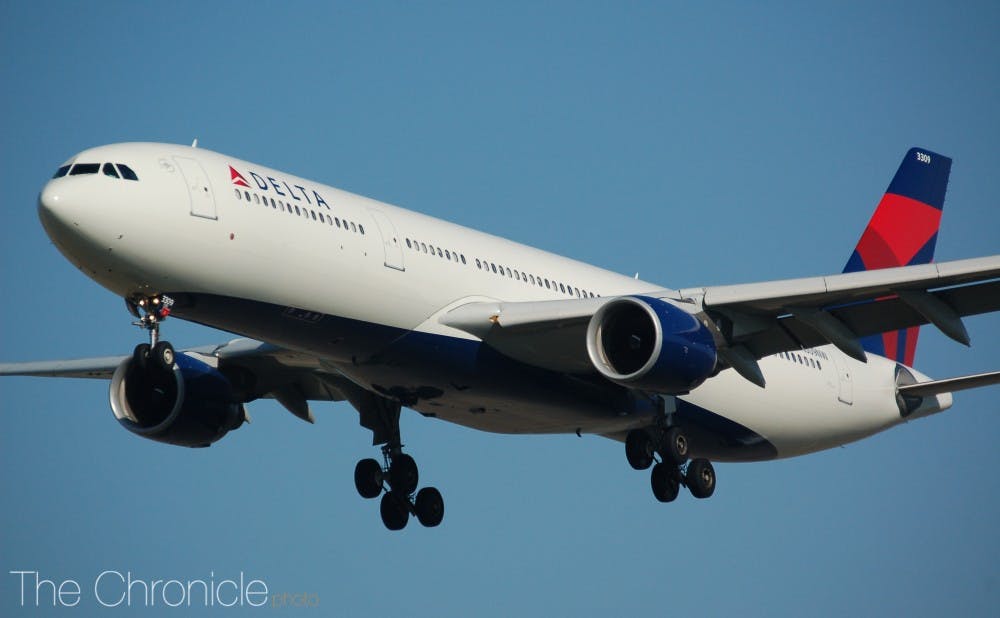Duke has partnered with Delta Air Lines to launch a program dedicated to offsetting carbon emissions produced by the institution.
Matthew Arsenault, program manager of the Duke Carbon Offsets Initiative, said Duke has an ambitious carbon neutrality date of 2024, and aims to forge partnerships in the pursuit of sustainability. With this new project, Duke and Delta will come together to buy 5,000 carbon offsets—equivalent to 5,000 tons of carbon dioxide or a similar gas being removed from the air.
“By reducing the emissions from activities on campus, like from replacing fleets with electric vehicles, we can reduce emissions on campus as compared to our previous footprints,” Arsenault said. “Then what’s left as far as those emissions go in our footprint will be offset.”
These offsets will be facilitated by Greensboro-based company Urban Offsets, which takes certified carbon offsets and runs risk assessments, then takes a portion of each purchase to support urban trees. The carbon offsets themselves will come from a landfill gas destruction project in Gaston, N.C., as methane is captured and destroyed instead of polluting the atmosphere.
“By the time it becomes 2024, [Duke] is going to have to eliminate 185,000 metric tons of carbon dioxide,” said Urban Offsets CEO Shawn Gagné said. “This is huge, but that is pretty average across universities.”
Delta Air Lines is the official airline of Duke Athletics and the University and has previously partnered with Duke in 2015 to offer a discount program for Duke employees and students, as well as a nonstop flight from Raleigh-Durham International Airport to Paris.
Gagné described an emissions overlap, as Delta and Duke count the same emissions toward their respective carbon footprints. Arsenault said those emissions include Duke’s flights with athletics, faculty and students.
“Air travel is a huge contributor to greenhouse gas emissions, and obviously Duke is a large institution, so people fly a lot,” Arsenault said. “We are making all of Duke’s travel on Delta airlines in 2017 carbon neutral, and that’s just with this one project.”
In addition to the carbon offsets from the landfill, Urban Offsets will facilitate Duke’s sustainability goals through a tree planting project in Durham, with 1,000 trees scheduled to be planted around the city by the end of March.
“Urban trees are on the decline nationally, and urban forestry is something really worthwhile to support,” Arsenault said. “There’s educational, social and environmental benefits for having trees in urban areas. We’re bundling those benefits with the immediate carbon impact of buying the offsets.”
About 600 trees have already been planted, but there will be two more planting events hosted by nonprofit Keep Durham Beautiful. They are scheduled to be held Feb. 10 and Feb. 24, and Arsenault said the program would love to see local and student volunteers contributing. These trees will eventually remove an additional 5,000 metric tons of carbon dioxide from the air.
“As those trees grow, they themselves will sequester some pollution,” Arsenault said. “They’ll help remove pollution from car exhaust, filter the air for folks walking around Durham and help reduce storm water runoff. All of these benefits will only increase as the trees grow.”
About half of those 1,000 trees will be planted in very specific areas of the city, based on a 2016 Masters Project completed by Gregory Cooper, Anne Liberti and Michael Asch who received their master's degrees in 2016. The project examined maps of redlining—the practice of denying services—in Durham from the 1930s, in which lower-income neighborhoods were delineated.
The program then took these maps and used aerial imagery to determine which areas of the city lacked trees and establish target locations for planting.
“You can look at trees planted at the same time, and you can see what the historical infrastructure was based on the trees,” Cooper said. “We found that historically black neighborhoods had fewer trees than historically white, affluent neighborhoods.”
Cooper said these maps highlight the inequality within the city, but that this trend is not unique to Durham. He hopes the project will help raise awareness of the importance of urban forestry.
Gagné said this project is one of the first of its kind, and said that in addition to urban forestry, he hopes people become more aware of the value of sustainability initiatives.
“We want people to see that sustainability can support the mission of the organization that buys in,” he said. “By tying every single thing to a tangible aspect—the tree in the community that everyone can see—we’re saying that sustainability is here, it’s local, it’s something everyone can be involved in.”
Get The Chronicle straight to your inbox
Signup for our weekly newsletter. Cancel at any time.

